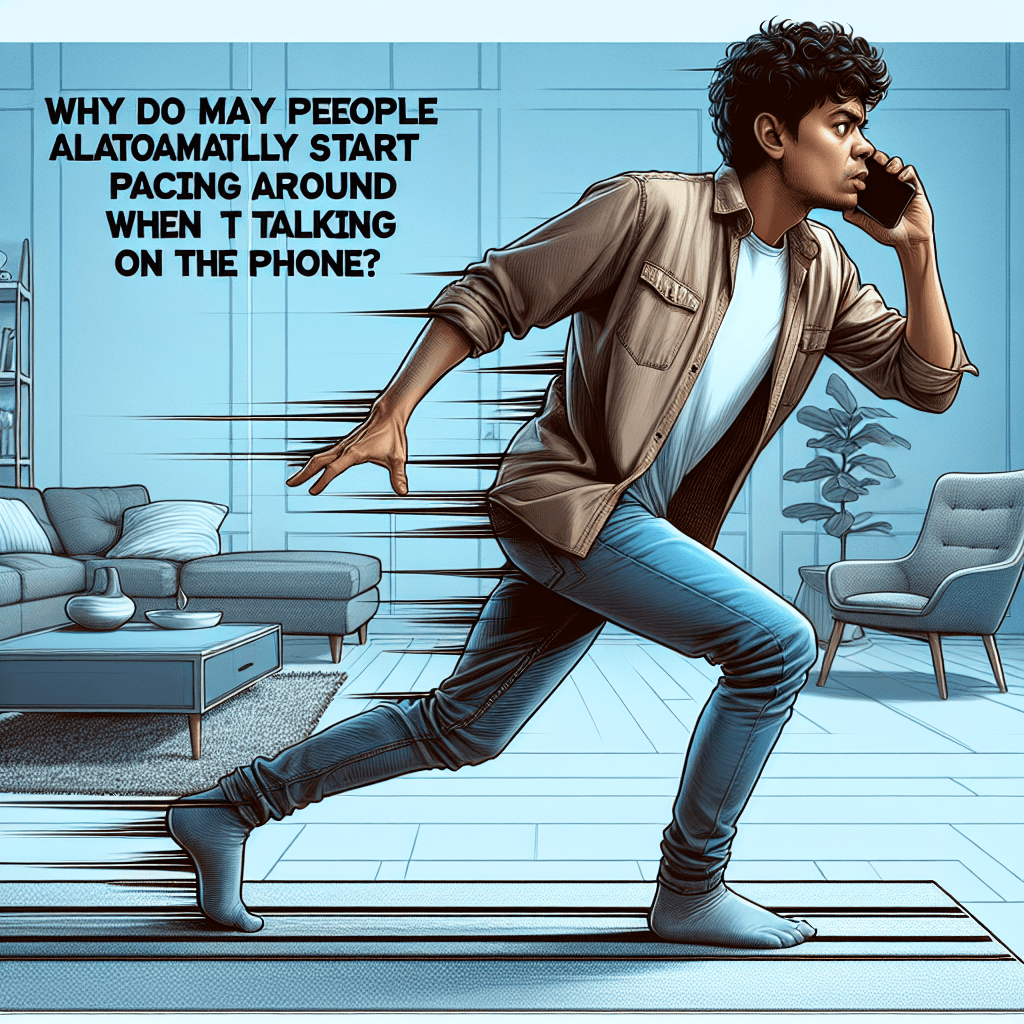The Phone Pacer Phenomenon: Why We Walk While We Talk
Ever find yourself wandering around the room during a phone call without even thinking about it? You're not alone, and there's a fascinating reason for this surprisingly common habit.


Too Long; Didn't Read
Many people have an automatic tendency to pace around while talking on the phone. This post explores the psychological reasons behind this behavior.
Blog Post Title: The Phone Pacer Phenomenon: Why Do Many People Automatically Start Pacing Around When Talking on the Phone?
Introduction
Have you ever found yourself wandering aimlessly around your room, office, or even outdoors while deep in a phone conversation? You hang up, realize you've logged quite a few steps, and wonder why standing still felt so unnatural. You're certainly not alone. This seemingly automatic behavior – pacing while talking on the phone – is incredibly common. But why does picking up the phone often trigger the need to move? This post delves into the fascinating cognitive, physiological, and psychological reasons behind the widespread habit of phone pacing, exploring why our bodies often insist on moving while our voices connect across distances.
Main Content
Cognitive Enhancement: Moving to Think
One compelling reason for pacing relates directly to how our brains function. Many cognitive processes, including concentration, memory recall, and problem-solving, appear to benefit from physical movement.
- Increased Blood Flow: Walking increases blood flow, including to the brain, which can enhance alertness and cognitive performance. When engaged in a demanding conversation that requires focus or quick thinking, pacing might be an unconscious strategy to boost brainpower.
- Combating Distraction: Movement can sometimes help filter out external distractions, allowing the individual to focus more intently on the auditory information coming through the phone. The act of pacing creates a sort of "bubble" of concentration.
- Aiding Thought Processes: Some research suggests a link between walking and creative thinking or complex thought organization. The rhythmic nature of pacing might help structure thoughts or access memories more effectively during a conversation. Think of it as your body helping your brain process the information being exchanged.
Channeling Nervous Energy and Emotion
Phone calls aren't always casual chats; they can involve negotiations, difficult news, exciting updates, or stressful discussions. Pacing often serves as a physical outlet for the emotions and nervous energy generated during these calls.
- Stress Release: Just like fidgeting or tapping a pen, pacing can be a way to dissipate stress, anxiety, or nervous tension that builds up during a conversation. The physical activity provides a release valve for pent-up energy.
- Expressing Excitement: Conversely, pacing can also accompany excitement or enthusiasm. The physical movement mirrors the heightened emotional state.
- Regulating Arousal: Pacing might help modulate our physiological arousal level, preventing us from feeling either too agitated or too lethargic to engage effectively in the conversation.
Compensating for Missing Non-Verbal Cues
Unlike face-to-face interactions, phone calls strip away a crucial layer of communication: visual cues. We can't see the other person's facial expressions, gestures, or body language, which normally provide context and feedback.
- Filling the Void: Pacing might be an unconscious attempt to reintroduce a physical dimension to the interaction. It's a way of "acting out" or embodying the energy of the conversation when visual expression isn't possible. We use our bodies to help convey or process the meaning that would otherwise be partially communicated visually.
- Maintaining Rhythm: The physical rhythm of pacing can sometimes help regulate the rhythm and flow of speech, preventing awkward pauses or interruptions, particularly when we lack the visual turn-taking cues present in person.
Habit Formation
For many frequent phone users, pacing may simply have become a deeply ingrained habit.
- Conditioned Response: If you started pacing during phone calls early on (perhaps due to one of the reasons above) and continued doing so, the behavior can become automatic. Picking up the phone becomes the cue that triggers the pacing response, even if the original reason (like needing to think hard or release stress) isn't present in every call.
- Environmental Factors: In the era before cordless and mobile phones, being tethered by a cord might have encouraged small, repetitive movements within a limited space, potentially laying the groundwork for the pacing habit.
Conclusion
So, why do so many of us automatically start pacing when on the phone? It's rarely due to a single cause. Instead, it's often a confluence of factors: an unconscious effort to boost cognitive function and focus, a physical outlet for nervous energy or emotion, a way to compensate for the lack of visual communication cues, or simply a well-established habit. This common behavior highlights the intricate connection between our minds, bodies, and communication styles. The next time you find yourself wandering during a call, you'll know it's likely your brain and body working together, trying to optimize the conversational experience in their own unique, ambulatory way.


